Speakers
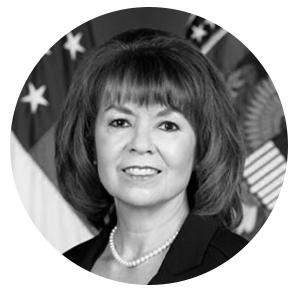
Cynthia J. Mendoza
Deputy Chief Information Officer (DCIO), Chief Information Officer
U.S. Department of Defense
Read More
Cynthia J. Mendoza
Deputy Chief Information Officer (DCIO), Chief Information Officer
U.S. Department of Defense
Dr. Cynthia J. Mendoza is the first Deputy Chief Information Officer for Special Access Programs,
Information Technology (DCIO SAP IT), for the Department of Defense (DoD). In this role she is
responsible for leading the department’s efforts in modernizing capabilities, realizing efficiencies and strengthening cybersecurity across compartmented IT.
Prior to becoming the DCIO SAP IT, she served as the Chief Technology Officer at the Bureau of
Intelligence and Research (INR), U.S. Department of State. In that role she was responsible for advancing innovative technologies for use by a diverse set of global customers to connect intelligence producers and consumers in the advancement of National Security and U.S. Foreign Policy Objectives.
Previously, she was the Acting Deputy Chief Information Officer (CIO) and the Intelligence Community (IC) Chief Architect at the Office of the Director of National Intelligence (ODNI). In that capacity, Dr. Mendoza was responsible for advocating and leading the IC CIO in its modernization efforts within the IC Information Technology Enterprise (IC ITE), the IC Information Environment (IC IE), and ensuring thesecurity and protection of the IC’s IT systems. Prior to this role, she served as the Director of the Architecture and Integration Division (AID) and IC Chief Architect for the Office of the IC CIO where she established and championed the Reference Architecture Framework (RAF). The RAF was used to develop, coordinate, and publish the scalable IC Enterprise Architecture (EA) baseline, evolution, and future plans driven by the community. The EA is currently used to define mission gaps, overlaps, critical linkages, and dependencies; and to drive interoperability and intelligence integration across the IC IE. Her service at the ODNI included a term as the Director of Requirements Analysis within the Office of Systems & Resource Analyses, Program and Requirements Division. In that position, she was the focal point for evaluating, guiding, and assessing IC system capability requirements necessary for Major System Acquisitions.
Dr. Mendoza has served as the National Geospatial-Intelligence Agency’s (NGA) Information
Management Program (IMP) Advisor, Chief Engineer of the Agency, Director of the Architecture and Engineering Group, and the Deputy Director (DD) of the Strategic Planning Group within NGA’s Chief Information Officer (CIO) and IT Directorate (CIO-T). Dr. Mendoza also served as Director of the National Center for Geospatial-Intelligence (GEOINT) Standards and Director of the Acquisition Enterprise Support Program Office for Agency Support Services contracts. In those roles, she led highly diverse and complex teams that delivered an enterprise-wide Information Management Plan, merged three major component organizations, mapped enterprise capabilities to organizational portfolios, and transformed the IT apparatus for the Geospatial-Intelligence Management System (GIMS), the Integrated Analytic Environment (IAE) and major IT acquisition programs.
Dr. Mendoza has more than 30 years of experience leading government and industry organizations; prior to her government service, she worked as Vice President of Operations for Galactic Technologies, Inc., in San Antonio, Texas, where she led industry and government contracts, including services to the Air Force Intelligence Agency. She holds a B.S. in Electrical Engineering from Texas A&M University, and an M.S. and Ph.D. in Systems Engineering and Engineering Management from the George Washington University.
Dr. Mendoza has received numerous awards including the “2018 Pillar of Character” award from the Northside Independent School District, San Antonio, Texas, the 2007 “Outstanding Women at NGA” award, the 2008 “NGA Small Business Award,” and the “San Antonio Woman of the Year for Leukemia & Lymphoma Society Fundraising.” She also serves as the champion for the Hispanic Employee Program Council at NGA. A native of San Antonio, Texas, Dr. Mendoza has completed the Marine Corps Marathon and holds a
second-degree black belt in Tae Kwon Do. She lives in Virginia with her family.
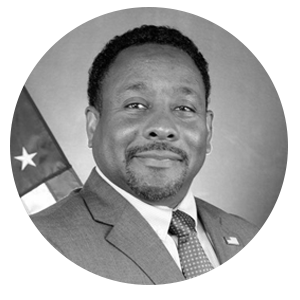

Glenn Jones
Chief Information Officer
Naval Surface Warfare Center
Glenn Jones serves as the Activity Command Information Officer (ACIO) and Information Technology Division Director at the Department of Navy, Naval Sea Systems Command Naval Surface Warfare Center Dahlgren Division (NSWCDD) located in Dahlgren, Virginia. Jones has over 30 years of federal government service and has served as IT Manager at nine different federal agencies within the Departments of Agriculture and Homeland Security and the Department of Defense.
This vast wealth of experience involved serving as IT Program Manager within the Department of Agriculture, managing delivery of IT services in disaster situations while working for the Federal Emergency Management Agency, and as IT Customer Solutions Manager within the ultra-secure, highly critical “no-fail” mission of the United States Secret Service. As the current NSWCDD IT Director/ACIO, Jones delivers strategic vision, leadership, management and oversite of the entire NSWCDD IT ecosystem comprising highly complex research and development networks designed to deliver next-generation technology to thewarfighter. Jones is committed to delivering cutting edge IT solutions designed to revolutionize the end-user IT experience.
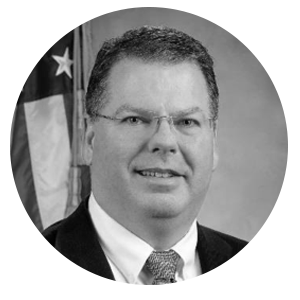
Brian Griffith
Deputy Assistant Director CJIS, Technical, Finance, and Logistics Branch
FBI
Read More
Brian Griffith
Deputy Assistant Director CJIS, Technical, Finance, and Logistics Branch
FBI
In September 2020, Brian D. Griffith was named as the deputy assistant
director of the Technical, Finance, and Logistics Branch (TFLB) in the Criminal Justice Information Services (CJIS) Division in Clarksburg, West Virginia.
In his current position, Mr. Griffith manages the Information Technology Management Section
(ITMS) and Resources Management Section (RMS).
ITMS is responsible for the systems and IT infrastructure that enable the FBI’s support to
federal, state, local, and tribal law enforcement agencies. These critical components include
Next Generation Identification (NGI), National Crime Information Center (NCIC), National
Instant Criminal Background Check System (NICS), Law Enforcement National Data Exchange
(N-DEx), Uniform Crime Reporting (UCR), and Law Enforcement Enterprise Portal (LEEP).
RMS is responsible for finances, facilities, logistical services, multimedia productions, training,
records management, awards, applicants, wellness, and security.
Griffith began his career in 1988 as a software engineer with the AT&T Network Services
Division in Cincinnati, Ohio. During his time with AT&T he rose to the rank of Systems
Manager, overseeing a variety of access ordering and provisioning systems, projects, and
corporate initiatives. Mr. Griffith exited AT&T in 1998 to assist with the startup of IntraGlobe,
Inc., a San Ramon, California, based software services and consulting firm supporting factory
floor automation systems for the North American automotive industry. In 2001, Mr. Griffith
joined the Institute for Scientific Research in Fairmont, West Virginia, where he served as the
vice president of Programs and Business Development, leading advanced aerospace research and development programs for industry, NASA, and the Department of Defense.
Since entering on duty with the FBI in July of 2010, Mr. Griffith has led a number of FBI
initiatives, including UCR Redevelopment and the End-to-End Video Initiative, which embodies
the FBI’s modernization of its video infrastructure for digital evidence and video surveillance
capabilities. Griffith has inspired and overseen the cloud migration of CJIS services and the
strategic methodology transformation to the Scaled Agile Framework (SAFe). He served as the
assistant section chief of ITMS, a senior level technical advisor, and then as the section chief of
the ITMS prior to his current assignment.
Mr. Griffith holds a bachelor of science degree in Information Systems from the DeVry Institute
of Technology in Columbus, Ohio. He is a Project Management Professional and earned his
Federal Acquisition Certificate in Program/Project Management (FAC-P/PM).
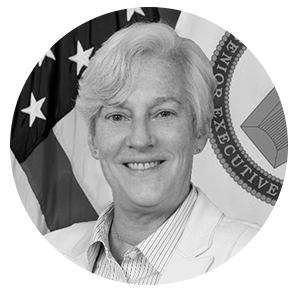

Cynthia Bedell
Director of Computation & Information Sciences
Army Research Lab
As the director for the U. S. Army Research Lab (ARL) Computational & Information Sciences
Directorate, Cynthia Bedell is responsible for basic and applied research into Network and
Information Sciences, Cyber Defense, and Battlefield Environments. She has technical
oversight of the state-of-the art high performance computing assets, to include artificial
intelligence computational capabilities, and wide area networking methodologies for ARL, DA,
and DoD. ARL is the U.S. Department of the Army’s corporate laboratory, strategically placed
within the Army Futures Command (AFC). ARL’s mission is to “operationalize science for
transformational overmatch”.
Previously, as the Regional Lead for ARL West, Cindy Bedell established the first extended
campus for the US Army Research Lab to make ARL and its researchers more accessible to
academics as well as business research leaders on the west coast. The strategically focused
partnerships goals are to accelerate understanding and capabilities in the field of Human
Information Interaction. When she joined CISD in 2014, Ms. Bedell served as the Associate
Directorate for Science and Technology as well as the collaborative alliance manager for the
Multi-scale Materials Enterprise.
Cindy Bedell brings with her 30 years of military experience. Prior to her military retirement,
Colonel Bedell led the US Army RDECOM Forward Element Command – Atlantic in searching
across Europe, Africa, and the Middle East, for applicable technologies to support current and
future warfighters. She also served as the Director of Science and Technology Support for
Current Operations for the System of Systems Integration Office, U.S. Army Research
Development and Engineering Command (RDECOM).
She helped develop science and technology strategies to allow the Army to address technology
shortfalls in current and future war-fighting systems. As Product Manager, Sensors and Lasers,
Colonel Bedell was responsible for the Soldier-borne night vision devices, thermal sensors and
sights, and laser pointers, rangefinders and designators. She accelerated the engineering
design cycles for a number of systems; to include the Enhanced Night Vision Goggle and the 25
micron Vanadium Oxide based Thermal Weapons Sight.
She earned both a Bachelor’s and a Master’s degree from the Massachusetts Institute of
Technology. She served as Assistant Professor in the Civil and Mechanical Engineering
Department at the United States Military Academy. In 2004-2005, she attended the University of
Texas, as a Senior Service College Fellow. She holds United States Patent 5,413,649, with Dr.
David Dunand for a method to enhance superplasticity for ease in forming complex composites
in materials that undergo phase transformation.
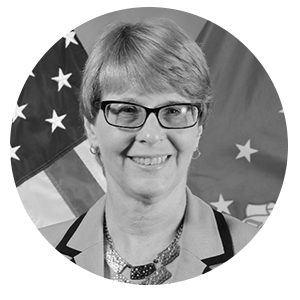

Lisa Sanders
Director, Science & Technology
SOCOM
Ms. Lisa R. Sanders is the Director of Science and Technology for Special Operations Forces, Acquisition, Technology & Logistics (SOF AT&L), U.S. Special Operations Command (USSOCOM), MacDill Air Force Base, Florida. She is responsible for all research and development funded activities. Ms. Sanders has over 30 years of civilian Federal service.
Ms. Sanders entered Federal Service as an Electronics Engineer at Naval Avionics Center in Indianapolis, Indiana where she served in quality engineering, production engineering and program management. In 1996, she transferred to Naval Air Warfare Center and Naval Air Systems Command (NAVAIR), Patuxent River, MD, serving as an Electronics Engineer and Program Manager for the E-2C Hawkeye aircraft. In 2003, she assumed responsibility for the production and modification of the CV-22. During her time at NAVAIR, she managed one of the first Multi-
Year Procurements, and executed the modification and delivery of CV-22 production and developmental test aircraft.
Ms. Sanders transferred to USSOCOM in 2005, where she retained responsibility for CV-22 production and worked as the Systems Acquisition Manager for the C-130 program in Program Executive Office Fixed Wing managing all C-130 projects across the Special Operations Forces inventory. In 2010, Ms. Sanders was promoted to position of Deputy Director for the Science and Technology Directorate; and in 2011, was assigned to the position of Director, Science & Technology.
In 2014, Ms. Sanders left USSOCOM to attend the Defense Acquisition University Senior Service College Fellowship in Aberdeen MD. She graduated in 2015, and was assigned to Headquarters, Air Force serving as the chair of the Air Force Capability Development Working Group. In 2016, she was selected as a Defense Intelligence Senior Leader.
Ms. Sanders has two children and two grandchildren.


Jared Dunmmon
Technical Director
Defense Innovation Unit (DIU)
As Technical Director for DIU, Jared focuses on bringing a technical perspective to problem
curation, vendor sourcing and evaluation, and project execution. Prior to DIU, Jared was a
Postdoctoral Research Fellow in Computer Science at Stanford University, where his research
focused on combining heterogeneous data modalities, machine learning, and human domain
expertise to inform and improve decision making around such topics as human health, energy &
environment, and geopolitical stability.
Jared has also worked to bridge the gap between technological development and effective
deployment in a variety of contexts including foreign policy at the U.S. Senate Foreign Relations
Committee, solar electrification at Offgrid Electric, cybersecurity at the Center for Strategic and
International Studies, emerging technology investment at Draper Fisher
Jared holds a PhD from Stanford University (2017), a B.S. from Duke University, and both an
MSc. in Mathematical Modeling and Scientific Computing and an M.B.A. from Oxford, where he
studied as a Rhodes Scholar.


Ken Persel
Senior Client Executive
Amazon Web Services
Data-driven, strategic business executive focused on customer impact and
outcomes. Passionate about growing global organizations, creating operational
excellence, and efficiency.
Ken Persel is an AWS Mission Partner for the US Department of Defense,
working at AWS since 2016. In his role, Ken helps the US Air Force use cloud
technologies to enable warfighter readiness and improve mission outcomes
through technology. Prior to joining AWS, Ken served in business and talent leadership roles for CISCO
and EMC Corporation (now Dell Technologies).


Kitty Nix
Senior Manager, Navy Account Team Lead
Amazon Web Services
Kitty Nix is a seasoned government executive with a consistent track record of leading teams across a broad spectrum of strategic and tactical functions including sales and business development, division profit and loss management, capture, corporate strategy, program management, client consulting, organizational development, and human capital management, spanning more than 25 years in the government market. Currently she is the Senior Manager for the Navy & Marine Corp Account Team at Amazon Web Services. In this role she leads a team of more than 25 people and is responsible for the sales and delivery of services to the United States Navy and Marine Corps.
As a leader, Kitty effectively develops cultures of high performance, focused on attracting and retaining top talent to deliver customer focused outcomes. Kitty’s leadership begins with her ability to collaborate with her colleagues and communicate a vision in a manner that ensures purpose, expectations and outcomes are clear, commitments are kept, and milestones are met. Her key strengths are using innovative thinking, a foundation of trust, and decades of experience and resourcefulness, to tackle new challenges and drive teams to over-achieve. She always maintains a focus on the big picture, but consistently manages and participates in the implementation of the details.


Maj. Jason Rathje
Director
AFVentures & Division Lead, EGF
In his current role at AFVentures, Jason is part of a team that implements novel initiatives to mature and transition "dual-use" technology ventures. Their approach is to build relationships between commercial solution-providers and Air Force problem-owners, and scale successful problem-solution matches. AFVentures is successful if their initiatives accelerate a product-market fit between the companies who are passionate about national security and Air Force users who need their revolutionary technologies. Prior to this, Jason spent three years researching the intersection of entrepreneurship, innovation, and national security in Stanford's Management Science & Engineering Department, specializing in technology entrepreneurship strategies. Specifically, he studied the effect of government partnerships, both as an investor and customer, on basic research through commercialization. This research heavily influenced his involvement in AFVentures, as well as sparked new research projects on how to more intelligently expand the dual-use economy.
